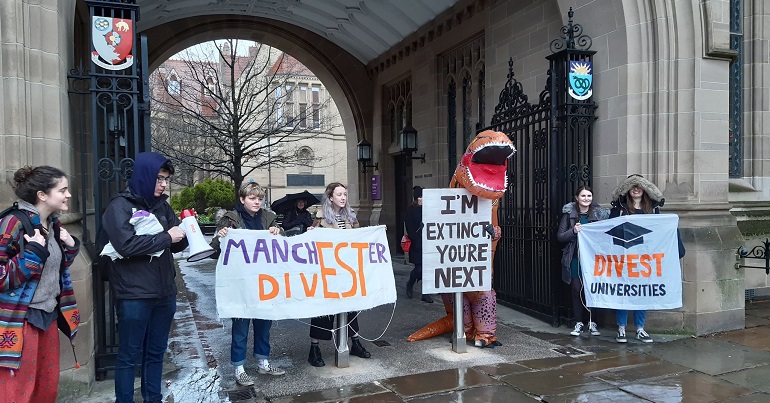Lessons and legacies from the University of Manchester divestment victory

On 22 May 2020, the University of Manchester became the 82nd UK university to announce its divestment from fossil fuel companies, after more than eight years of campaigning by the student group People and Planet. Along with ceasing its £11,975,986* investment in the fossil fuel industry by 2022, it has committed to decarbonising its full portfolio by 2038.
From petitions to protests, storming meetings to occupations, this was a grassroots, student-led campaign that used almost every tactic in the book. After years of escalating actions there was an occupation in June 2019 that was forced to end after 24 hours, due to students being denied access to food, water and toilets. Rather than deterring them, those who experienced the callousness of university management were only further determined to increase the pressure in the following academic year.
Our involvement with the movement came in late 2019, when, after months of planning, we entered into a week-long occupation of a university building in November. Despite attempts from the university to restrict access to food, power and supplies, we remained in the building until management were forced to the negotiating table with Students’ Union representatives. These negotiations led to a commitment to bring forward a review of their ‘Socially Responsible Investment Policy’ and a meeting to discuss full decarbonisation of the investment portfolio. It was this review, meeting and subsequent consultation that finally led to the recent divestment announcement.
A key to the success of the campaign was having strong allies and voices at all levels. What proved particularly crucial was that not only were our Students Union Executive Committee supportive, two members were integral parts of our campaign for several years, even taking part in the occupations. As our elected representatives, it was their negotiation with the University management and their consistent lobbying of the Finance committee that pushed divestment further up the agenda. Having voices we could trust in the conversations with senior management, that not only represented our movement but were core members of the campaign was invaluable. It shows yet again the power of having a seat at the table if you want issues raised at a higher level, as well as the importance of elected representatives remaining embedded in grassroots movements.
It has been the persistence of students throughout the years and escalating actions that led to this success that offers more in its significance than just the financial win. As with every divestment victory, the capital investment is never the main focus, as a reduction of almost £12 million is small change for a multi-billion pound industry. Instead, these campaigns work to undermine the legitimacy and social license that allows these fossil fuel companies to operate in the first place.
The University of Manchester is currently one of the largest universities in the UK, and recently the Vice-Chancellor, Nancy Rothwell was appointed to become Chair of The Russell Group. The victory of divestment here is significant, as Manchester’s size and reputation further increases the pressure on others to follow. Not only this, but investing in companies complicit with climate breakdown is clearly hypocritical, as it is within research-intensive institutions like Manchester – home to the Tyndall Centre – where the most cutting-edge work on climate change takes place.
However, divestment from fossil fuels is only one of many changes necessary on campus. It needs to be recognised that universities are built on systems of exploitation and oppression, and that addressing intersectional issues of colonialism, capitalism and patriarchy is at the heart of achieving climate justice. Therefore, work to dismantle these injustices only begins at fossil fuel divestment. The review of the university’s portfolio can be used as a way in for other divestment campaigns on campus concerned with global justice, such as Demilitarise Education (dED_UCATION), Boycott Divestment and Sanctions (BDS) and Decolonise UoM.
Despite the challenging nature of university campaigns due to student turnover, this is a movement that has gone from strength to strength over the past eight years. A huge part of this is down to the incredible perseverance of individual student activists, but is also testament to the support that the People and Planet network offer. Having resources, contacts and knowledge that aren’t lost with each generation of new students is fundamental to the viability of long-term campaigns like these.
The combination of eight years of student pressure, the diversity of tactics used, electing supportive student representatives and connecting to wider campaigns, allowed us to overcome the resistance presented by the university. Whilst the 2038 decarbonisation target is arguably far too late, and divestment is only a small part of the progress needed to create a sustainable future, this is still a positive change. Each divestment win is a powerful political gesture which works to delegitimise the power fossil fuel companies have to exploit people and the planet. However, more than anything, this victory in Manchester shows the power and potential of grassroots campaigns and sustained collective action.
*Figure from a September 2019 Freedom of Information request by People and Planet.
PS. Bright Green has big plans for the future, but we need your input. Take 2 minutes to see what we’re planning and tell us your thoughts.
Image credit: Kayleigh Crawford – Creative Commons




Leave a Reply